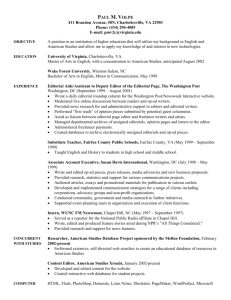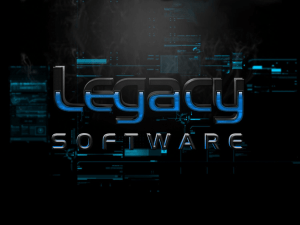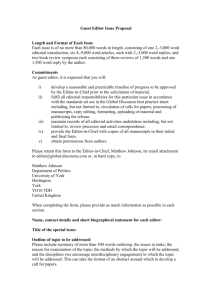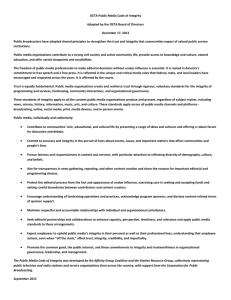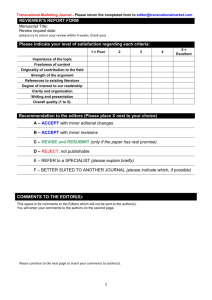summary - Results
advertisement
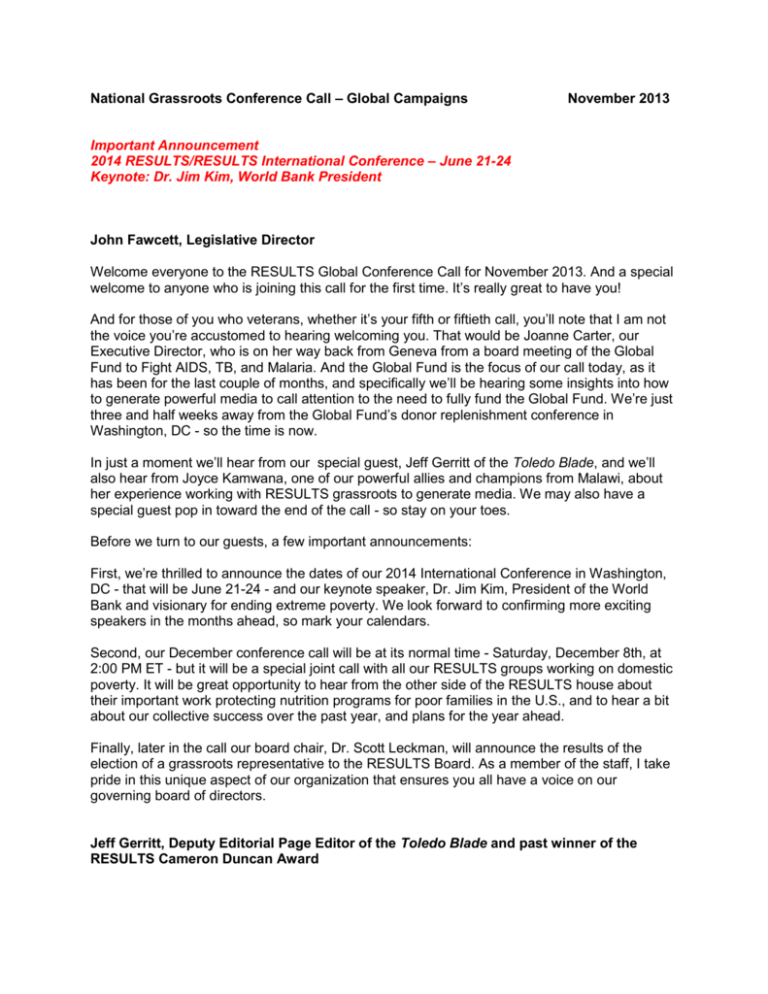
National Grassroots Conference Call – Global Campaigns November 2013 Important Announcement 2014 RESULTS/RESULTS International Conference – June 21-24 Keynote: Dr. Jim Kim, World Bank President John Fawcett, Legislative Director Welcome everyone to the RESULTS Global Conference Call for November 2013. And a special welcome to anyone who is joining this call for the first time. It’s really great to have you! And for those of you who veterans, whether it’s your fifth or fiftieth call, you’ll note that I am not the voice you’re accustomed to hearing welcoming you. That would be Joanne Carter, our Executive Director, who is on her way back from Geneva from a board meeting of the Global Fund to Fight AIDS, TB, and Malaria. And the Global Fund is the focus of our call today, as it has been for the last couple of months, and specifically we’ll be hearing some insights into how to generate powerful media to call attention to the need to fully fund the Global Fund. We’re just three and half weeks away from the Global Fund’s donor replenishment conference in Washington, DC - so the time is now. In just a moment we’ll hear from our special guest, Jeff Gerritt of the Toledo Blade, and we’ll also hear from Joyce Kamwana, one of our powerful allies and champions from Malawi, about her experience working with RESULTS grassroots to generate media. We may also have a special guest pop in toward the end of the call - so stay on your toes. Before we turn to our guests, a few important announcements: First, we’re thrilled to announce the dates of our 2014 International Conference in Washington, DC - that will be June 21-24 - and our keynote speaker, Dr. Jim Kim, President of the World Bank and visionary for ending extreme poverty. We look forward to confirming more exciting speakers in the months ahead, so mark your calendars. Second, our December conference call will be at its normal time - Saturday, December 8th, at 2:00 PM ET - but it will be a special joint call with all our RESULTS groups working on domestic poverty. It will be great opportunity to hear from the other side of the RESULTS house about their important work protecting nutrition programs for poor families in the U.S., and to hear a bit about our collective success over the past year, and plans for the year ahead. Finally, later in the call our board chair, Dr. Scott Leckman, will announce the results of the election of a grassroots representative to the RESULTS Board. As a member of the staff, I take pride in this unique aspect of our organization that ensures you all have a voice on our governing board of directors. Jeff Gerritt, Deputy Editorial Page Editor of the Toledo Blade and past winner of the RESULTS Cameron Duncan Award What we are up to is very difficult. Editors are barraged with requests, and most newspapers right now are going through challenging times – overworked, cranky staff! Getting someone’s attention alone can be tough. Don’t be discouraged – when you get published, do feel very good about it. Be persistent, which is different than being a “pest.” Be discerning about that and finesse it. But don’t wait for someone to call you back. Build relationships. If editors and writers know who you are, your chances of getting their attention and getting something printed are much better. It takes time – don’t start building that relationship right when you want something published. Months before you have something you want the editor to act on, pick up the phone and or write an e-mail and start that process. Remember that writers do have some autonomy in deciding what they write – so remember that relationship-building needs to happen with both editors and writers. Nowadays, the landscape of journalism is really “media outlets” with digital and print mediums, not simply “newspapers.” Offer material 3-4 weeks in advance. And make the information concise – send brief talking points. For example, press release + key talking points. Make sure the key information for the story is included. Thank the editor or writer for their work. Thanks to RESULTS – admire what the grassroots do! Q&A How unique is it that a media outlet gets communication from a member of the public requesting an editorial? Editorials actually get requested quite regularly, depending on the size of the paper. For larger papers, editorial requests could come through at a rate of 12-15 a day. How should we deal with multiple regional papers that often share editorial resources and have smaller constituencies? Investigate the editorial arrangements with each paper and try to deal with each paper separately. There may not be as much resource-sharing as you might have assumed. How do we deal with the emphasis on local stories when trying to pitch globally focused editorials? Some smaller pages have abandoned editorial pages, and the focus on local is real. Newspapers know that they can make a difference in local and state matters, but they don’t always know if they can influence global matters. Localize the issues. Still try to make the case because most newspapers haven’t abandoned national and international issues and might still cover them 20-25% of the time. Impress upon the paper how critical the story is, and share clips showing how highly respected papers are covering it, to capitalize on “herd mentality” – this will help the paper see both the importance of the story and get a sense of it succinctly. Joyce Kamwana, Global TB/HIV Advocate from Malawi, introduced by Blair Hinderliter, Director of Operations and Communications No matter how small your paper or community are, getting our issues into those outlets still matters. Getting the issue into a media outlet draws out the conversation and generates debate – this is good. Your work is creating a better world to live in. John Fawcett, Legislative Director Our current advocacy focus: generating supportive media in advance of the Dec. 3 replenishment conference for the Global Fund to Fight AIDS, Tuberculosis and Malaria. The U.S. is making its diplomatic leadership felt by encouraging other countries to step up at this meeting. And other countries are beginning to step up for sure. But what happens over the next 3 years? We must commit $5 billion over 3 years – this is 1/3 of the total $15 billion that the Global Fund needs. So far, we have generated 4 editorials, 2 op-eds, and 17 letters to the editor, with more on the way Resources: Editorial packet, November laser talk, current media you can share, an upcoming blog post on our media efforts Check out resources online: http://www.results.org/blog/global_fund_replenishment_will_happen_in_december_and_were_g etting_to_work/ Think creatively about your local hooks – medical schools, local events, YOU The media you generate and report to us will be leveraged this fall. Your voices are powerful in aggregate. Everything that you publish, we try to leverage it on social media (you can, too!) – and that gets picked up by allies and decision-makers alike. And the media packet is going to be sent to relevant decision-makers at the White House, State Department, etc. Thank you for the important work you’re doing, including hosting traveling media advocates! Congresswoman Barbara Lee, HIV/AIDS Champion in the House A leading champion in the House on behalf of poor and marginalized people, both at home and abroad, she has authored or co-authored every major piece of HIV/AIDS legislation in Congress since she was elected, including the bills that established both PEPFAR and the Global Fund, and the recently introduced PEPFAR Stewardship and Oversight Act. (Shout-out to Bay Area advocates!) Global health remains a priority – and we are at a defining moment if we want to achieve an AIDS-free generation. We must keep the pressure on. We know a U.S. pledge of $5 billion over 3 years will leverage other money. This is a challenging fiscal moment, but it’s a pivotal moment for preserving our investments and not falling back – we must move forward. Thank you for your diligence and your hard work! GRASSROOTS CAFE Dr. Scott Leckman, RESULTS/RESULTS Educational Fund Board Chair Three great candidates in a close election (Frank Gilbert, Roger Hudson, Lydia Pendley) – congratulations to Lydia Pendley for her election to a second term! As grassroots volunteers your leadership in the organization is so important—from the roles you play in your chapters, to fundraisers, to Group Leaders, to Regional Coordinators. The Grassroots Board members help us manage the organization at the highest level. Congratulations! We want to next hear from Heide Craig, Group Leader in Greenville, SC, Grassroots Board member, and Regional Coordinator for FL, GA, SC, AL, MS. She’s going to share about her recent experience reaching out to her editorial page editors. Heide Craig, Regional Coordinator You’ve got to start with that first phone call to your paper! Called, sent materials, called back . . . and got editorial writer in person! She said she was interested in local issues and have no time even to receive visitors. Quickly asked about a written op-ed . . . she made no promises, but she did take time to look for Heide’s previous e-mails. She discovered that Heide’s e-mails had been hitting her spam folder! Wow – this was a big step forward. For those who haven’t had the media success you want yet, take heart! When I asked Heide to do this share she said to me, but I wasn’t successful yet. But I wanted her to share because I think we really need to readjust our idea of success in working with the media. We regularly talk about how our power really lies in creating relationships—this is true with our members of Congress, community grasstops leaders, community members, and the media. But relationships aren’t developed overnight. Think about any good friend, colleague, or love interest—did you become close after the first contact? Most likely not. So let’s take a look at Heide’s relationship development and see what she accomplished: 1. Her email to the editor is no longer in the spam folder—the editor will actually receive her emails in her in box. That seems like an important step. 2. The editor knows her name, so that when an email shows up in the in box or when Heide calls or leaves a voicemail, the editor will know who it is. 3. The editor knows what Heide cares about and knows a bit more about the Global Fund and where we are on addressing these diseases. 4. The conversation has cracked the door open on getting an op-ed in the paper—the editor encouraged her to write, though didn’t promise to publish it. From the op-ed the editor will learn even more and get to know Heide even better with more communication. This is a great start at relationship-building. If one doesn’t recognize these successes it would be easy for Heide to give up right now and say she didn’t succeed. Instead, we need to acknowledge these advancements in building relationship and do what’s next to make them stronger. I’m sure you all have some great ideas, but here are a couple: 1. Read the paper every day and look for hooks for letters to the editor on our issues 2. Write that op-ed and submit it—get some back and forth going on it. Thank the editor for the back and forth. 3. Ask the editor to meet for coffee some day to learn more about what we do. Make a request that you work together to find one subject that they will write on at least once in the coming year. 4. Comment positively on their columns and editorials, even when not related to our issues. Acknowledge the importance of what they write—that it educates the public and affects decision makers. 5. Send follow up articles and information on the issue you asked them to write about so they learn more. Let them know the outcome of the Global Fund pledging conference, and the role that media played in that. 6. Amplify anything that gets printed by having people comment on it on line, post it to Facebook and Twitter, write letters in response. Remember, the question is not, how do I deal with this failure of not getting the editor to do what I want? But, how do I build on this budding relationship? Our next share today comes from Anne Child of our Austin Chapter. Anne is also Regional Coordinator for TX and LA. The folks in Austin just finished a fantastic fundraiser and outreach event, and Anne is going to tell us about it. Anne Child – Austin, TX Our group has been struggling to have a cohesive schedule. You know, people's lives are getting in the way of our volunteer work... because they are traveling for work or getting repairs done to their homes or nursing sick family member or themselves. But we had an opportunity to have Sam Daley-Harris speak at our fundraiser... the founder of RESULTS. How could we pass up an opportunity like that? Fortunately some things fell together quickly... the date, the venue, printing the invitations. Then we considered who else would present at the event. There is a young gal in the domestic team that went to the International Conference this year for the first time. She was a Head Start kid and is now a teacher... what a story... Her automatic reaction was "No, I can't do that" but then she realized she really felt honored. Then there's Mark. 20 years ago he heard Sam on the radio talking about the first edition of Reclaiming Our Democracy... and the Austin group was formed. Mark was the perfect MC. The night came... everything just seemed to come together. The caterer did a great job. Our guests came... not as many as we would have liked but enough. Sam and Sarah did a great job and the donations came in. We more than surpassed our goal just that evening and have raised about $20,000 over all. But the best part... was seeing the RESULTS magic. People were inspired by the evening. And we were ready to catch those who felt moved to participate. We had planned a follow up outreach meeting and it was on our printed program and announced by Mark. Three guests showed up at our outreach... but these were pre-qualified, after all they had heard Sam's pitch. Two of them are with us right now. The other will be keeping in touch with the domestic team. Though it was a lot of work, the process of the fundraiser has rejuvenated our team and brought us new friends. We are already looking forward to planning what we can accomplish next year. Thank you so much Anne and RESULTS Austin for your fantastic work on this fundraiser, and for your passion and dedication to the work we all do. Your fundraising efforts sustain this organization. There have been a lot of recent fundraising successes, and there are upcoming fundraising opportunities that we want to highlight today. Jen Maurer, Development Manager Hi everyone, this is Jen Maurer your Development Manager. I wanted to be on this call to thank each and every one of our groups who have held fundraising events in the last 2 weeks and throughout the year. Every fundraiser engages our donors and community in a personal way — I know of many of you who first found us through a fundraising event! It’s been a whirlwind of fundraising activity for us this last year — and especially this last month! In fact, we’ve raised well over $100,000 in the last couple of weeks, and there are still events coming up! These events — from a small house party to a huge gala — are so critical because they raise the most valuable money we receive. It sounds strange to say that one dollar might be more important than another, but it is true. Money raised by you, our grassroots partners, has no restrictions on it like grants. This means that you help RESULTS and RESULTS Educational Fund to be agile and able to respond strategically to urgent opportunities. This money also leverages grants because funders love to see what a deep and wide individual giving base we have. You also bring in monthly donors, and that stable stream of funding allow us to plan for the year. And perhaps the other wonderful thing fundraising is that you are making people happy. Think about how it feels when you donate. It feels great! So with one event you are raising valuable funds for RESULTS, cultivating brand new volunteers, and making people feel great. So here are some special shout-outs to groups who have gone over and above most recently: Thank you to Houston, Austin, and Ann Arbor who held events to let their guests connect and be inspired by our founder, Sam Daley-Harris. Thank you to Kitsap/Bremerton in Washington state who hosted Larry Reed, the executive director of the Microcredit Summit Campaign Thank you to Columbus and New Jersey who held joint global and domestic events, so that their partners could share their strengths and donors could learn about all sides of our work. And last, but never least, thank you to Inland Empire in California who bravely invited college students into a partner’s home for a beer tasting. We still have events coming up in Albuquerque, Santa Fe, and Olympia, WA, before the end of the year, as well as groups hosting “Virtual Thanksgiving Feasts.” If you would like to host an event for this year or even in 2014, please reach out to Cindy Levin at clevin@results.org It’s never too early to start planning a fundraising event! Polling Questions 1. Will you or your group be making follow up calls to editors in the coming week, asking them to write an editorial? On your phone keypad, press 1 if yes, 2 if no. YES = 30 2. How many op-eds on the Global Fund will you or your group be submitting in the next 2 weeks? On your phone keypad, press the number for your response. Example: 1, 2, 3, 4, etc. 21 groups/individuals are doing 1, 7 groups are doing 2, 2 groups are doing 3! 3. How many letters to the editor will your group and network get published in the next three weeks? On your phone keypad, press 1,2,3,4,5, etc. 10 are doing 1, 14 are doing 2, 8 are doing 3, 3 are doing 4, 1 is doing 5! Global Laser Talk November 2013 Pitching an Op-ed on the Global Fund to Fight AIDS, Tuberculosis and Malaria Engage: Luwiza Makukula is in the U.S. to thank us for saving her life. She is alive today because of the Global Fund to Fight AIDS, Tuberculosis and Malaria, and the U.S. is the top contributor. State the Problem: Few Americans know how things have changed around these three diseases over the past 10 years. They don't know how many lives our investments in the Global Fund have saved. Inform: Since 2002 the Global Fund has put 5.3 million people on antiretroviral therapy, has treated 11 million cases of deadly TB, and has distributed over 340 million mosquito bednets. The Global Fund saves an estimated 100,000 lives each month. Call to Action: I would like the people in our community to know more about the Global Fund and pass on Luwiza’s message of thanks. The best way would be an editorial. If not that, would you be open to printing an op-ed written by me that would highlight 3 things? 1. The track record of the Global Fund in saving and improving lives. 2. The feeling of gratitude expressed by Luwiza and others. 3. The opportunity we have to control AIDS, TB, and malaria and why U.S. leadership is critical during the December replenishment conference. http://www.results.org/take_action/global_laser_talk_november_2013/
